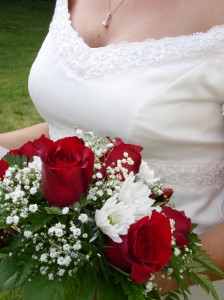I’m ambivalent about marriage in many ways.
I’m not a religious person, so the church stuff isn’t meaningful to me. Zak and I lived together for almost six years before we got married, and most things didn’t change after we tied the knot. He got fat, and I started denying him sex-otherwise, status quo.
Granted, we had two sets of china and enough barware to serve 50 different drinks to 50 people, but certainly our feelings for each other or our level of commitment were not really different on March 13th 1994 than they were on March 12th. We loved each other; we wanted to spend our lives together. We had a great party, said some nice things, shed a few tears and then we still loved each other, and still wanted to spend our lives together.
The thing that did change when we got married was how other people treated us. Zak’s parents were much warmer to me. My sister finally admitted that the relationship wasn’t “just a phase.” I immediately became “Aunt Leslie” to the nieces and nephews I had already spent years growing to love.
Some of our friends also treated us differently once we were married. A few of my high school girl friends insisted on addressing mail to “Mrs. Klobucher,” even though I never changed my name, and I’m pretty sure they weren’t trying to invite my mother-in-law to their baby shower.
The bank treated us differently too, and so did the government. It seemed almost everyone had an investment in marriage, although it meant different things to different people. My friend Susan said she felt “ten thousand times more secure in her relationship” after walking down the aisle. Joe said getting married made him feel “like a grownup,” and Tammy said it felt a lot like joining a sorority, “till death do us part.”
Older generations have a very different view of marriage. Greg said getting married made him feel like he “had this huge burden of responsibility for his wife,” while Connie said, “I felt like I was leaving my parents and joining a new family.”
Marriage can mean a myriad of things to individuals and couples, but it’s clearly hypocritical to pretend that it’s a sacred part of our society as a whole. Just look at the state of our unions in the last month, with Mark Sanford’s Argentine disappearing act eclipsing Jon and Kate’s primetime split and Sandra Tsing Loh’s marital implosion on the pages of The Atlantic.
The government’s definition of marriage is a legal union. That’s the one and only part of marriage that seems pretty simple and straightforward to me. Being able to marry who you want to seems like a basic human right, along with matching china and a great big party with all of your friends and family looking on.
It’s up to each of us to interpret what marriage means to us as individuals and couples. Men and women, women and women or men and men, all of us should have that right. Even though none of my gay friends got married when they had the opportunity-most of them felt more commitment than an actual marriage would confer, and they wanted to stay skinny and keep having sex-we all knew that they at least deserved the choice.

